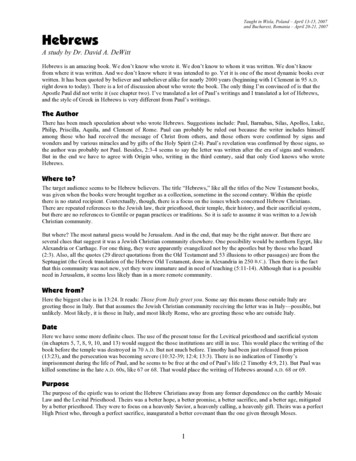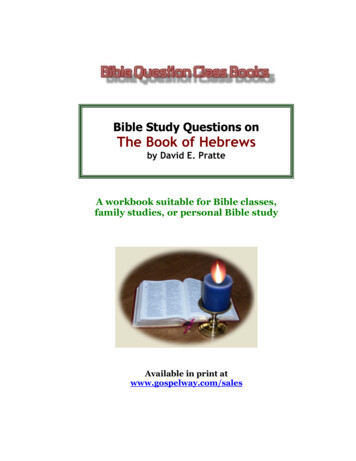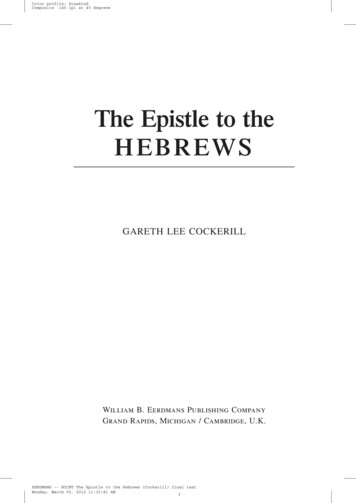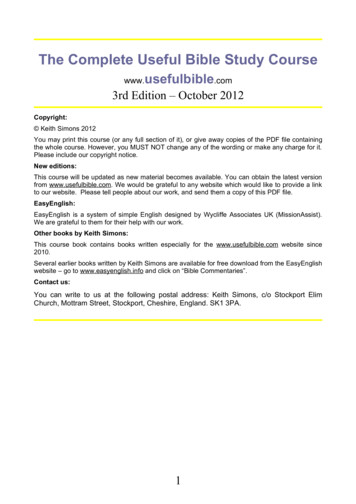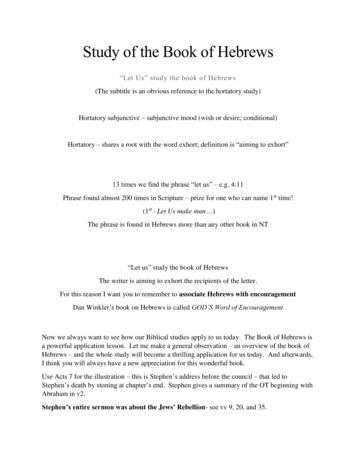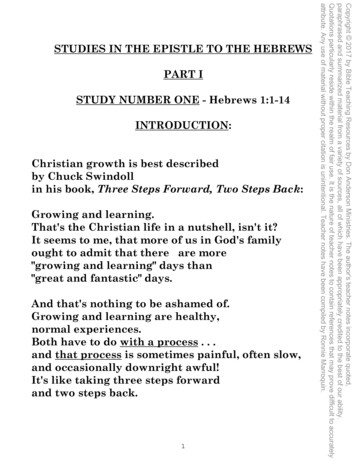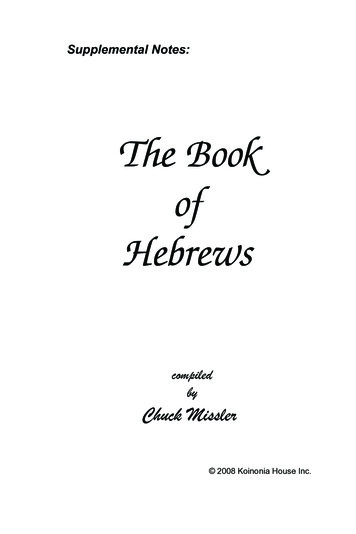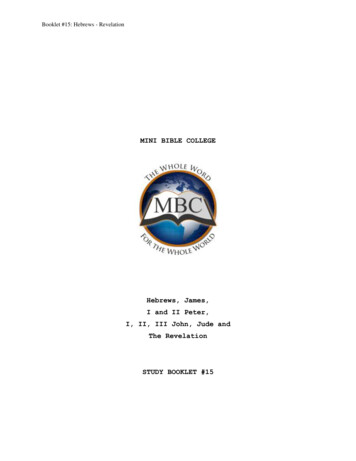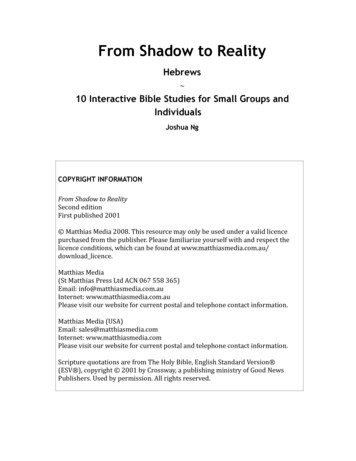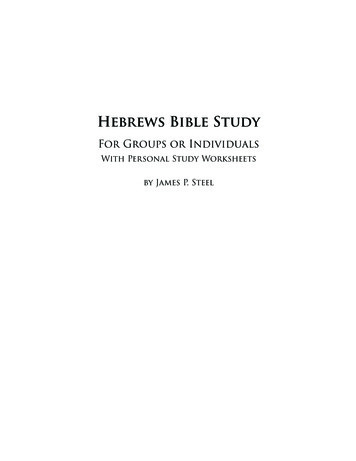
Transcription
Hebrews Bible StudyFor Groups or IndividualsWith Personal Study Worksheetsby James P. Steel
Hebrews Bible StudyFor Groups or IndividualsWith Personal Study Worksheetsby James P. SteelCopyright 2016 by James P. SteelISBN- 978-1533271570ISBN-1533271577Book Websitewww.BCMPubs.comEmail: contact@InternetBibleFellowship.comGive feedback on the book at:feedback@InternetBibleFellowship.comPrinted in U.S.A
Notifications and ForewordNotificationsPublication NoticeMay 2016Copyright 2016, James P. SteelBreadcrumbsMinistries.orgThis work is licensed under the Creative Commons Attribution-NonCommercial-NoDerivs 3.0 Unported License. To view a copy of this license, visit eed.en US.All photographic images are the original work of the author, in the public domain, or are licensed for this useonly.Unless noted otherwise, all quotations are from the King James version and basic Greek definitions cited arefrom Biblesoft’s New Exhaustive Strong’s Numbers and Concordance with Expanded Greek-Hebrew Dictionary.Copyright 1994, 2003 Biblesoft, Inc. and International Bible Translators, Inc.) This edition does not containGreek fonts due to our efforts to keep distribution free or at minimal costs.Any broad redistribution beyond typical needs in a local assembly or classroom may be done without permissionso long as significant (non clerical) alterations are not made to the text and no one benefits financially from theirdistribution. This page (notification) must be included with any redistribution (other than incidental pages) inorder to validate this grant.The Lord willing, PDF copies will be available for free non-commercial distribution through BiblicalIntensives.com.Printed copies are available through Amazon.com or Createspace.com and digirtal copies are available throughmost major distribution channels and formats.These and similar materials represent a labor of love added into an already full schedule. Suggestions for improvement and clerical adjustments are always welcomed. Contact us through the BiblicalIntensives.com website or, alternately, through BCMPubs.com.The editorial comments and interpretive postures contained in this syllabus represent Mr. Steel’s personal position only and should not be construed as the position of any school, church, or ministry he may be serving.James P. Steel - Hebrews Bible StudyPage 4
AcknowledgmentSpecial thanks go to our English teacher daughter, Kristin Thompson for help in the initial phases of editing andto my wife, Anne who followed up with an intense effort. Though time and funding has not allowed a full professional edit and correction (these notes are produced mostly for free distribution), she has graciously helped mescour these notes for errors.The cover graphic element is in the public domain. All charts are created by the author.DedicationThese notes are dedicated with gratitude to my loving wife, Anne, whose role as a loving helpmate has enabledme in all my endeavors for Christ during the past fifty plus years. Her constant encouragement, wise input, andhelpful assistance have affirmed her full partnership in all of our endeavors.ForewordWhy Another Set of Notes on the Epistle to the Hebrews?Whether there is a need for yet another set of notes on Hebrews is debatable. These notes were not produced tobring something new and novel to the forum on Hebrews. Rather, they have been provided to address a specificteaching context. Essentially, here is what the reader will find. These notes are designed first, for the typical believer, and secondly, for the pastor who ministers to the congregation as a whole. For this reason, they are devotional in style. While the reader will find many academic issuesaddressed, the notes are primarily a model for teaching or preaching through Hebrews. This style precludes somemore formal writing conventions and includes generous reference to the writer in the first person. It’s warmerthat way. Don’t underestimate these notes. They are designed to tackle difficult problems head-on. They often beginwhere other commentaries leave off when addressing the tougher questions of Hebrews. While every effort ismade to represent the opinions of others fairly, these notes do commit to specific interpretive positions whilerespecting divergent views. The notes model a thematic expositional style which is best understood by reading. While careful attention ispaid to good language analysis, the weight of the lessons center around the great biblical themes and argumentsof Hebrews, rather than on syntax and grammar. They interpret the scriptures from the perspective of JesusChrist, our Messiah. Finally, while no personal harm is intended, these notes specifically name and identify those movement andgroups which tend to draw glory away from the Lord Jesus Christ in their theology. While this may concernJames P. Steel - Hebrews Bible StudyPage 5
some, it should be noted that these groups also reserve to themselves the right to point out those with whomthey disagree. The popular practice of not naming names and organizations has left the average Christian unequipped to obey 2 Timothy 4:1-5.The nature of this study:Pastors looking for a deeply exegetical treatment of Hebrews will not find it here (See the bibliography in the Appendices section). While every effort has been made to respect the Greek and use it when appropriate and necessary, the notes in this text contain a mix of both information and exhortation. They are designed to be read andunderstandable by adults in general. They are in a format which lends easily for use in preaching and in teaching.As much as is practicable, the author will make himself available to anyone who needs assistance working with thesenotes or understanding Hebrews.A Word About the AuthorJim Steel has served equally in church planting, missions, and Christian education endeavors. His doctrinalposition is available at BreadcrumbsMinistries.org. His ministry has focused heavily on the centrality of Christand he stands without apology for the full and complete inspiration of the Bible and the doctrine of salvation bygrace alone through the sacrifice of our risen Christ. Dr. Steel is available for personal contact through the websites noted above.James P. Steel - Hebrews Bible StudyPage 6
Table of Contents4 Notifications and Foreword7 Table of Contents9 Heb. 1:1 - Chapter OneA Brief Introduction13 Heb. 1:2 - Chapter TwoThe Son Appointed Heir19 Heb 1:2 - Chapter ThreeThe Primacy of the Son - Part I25 Heb. 1:2 - Chapter FourThe Primacy of the Son - Part II29 Heb. 1:4-14 - Chapter FiveWhat’s In a Name?35 Hebrews 2:1-5 - Chapter SixA Warning Worth Heeding41 Heb. 2:5 – 6 - Chapter SevenIt Became Him - Part 147 Heb. 2:9-18 - Chapter EightIt Became Him - Part II53 Heb. 3:1-6 - Chapter NineFaithful Servant, Faithful Son59 Heb. 3:7-19 - Chapter TenStern Warnings65 Heb 4:1-8 - Chapter ElevenRest Easy69 Heb 4:9-13 - Chapter TwelveThe Sword of God75 Heb. 4:14-16 - Chapter ThirteenMega Priest79 Heb 5:1-5 - Chapter FourteenThis Position is Filled85 Heb 5:5-9 - Chapter FifteenThis Amazing Priest89 Heb 5:10-6:6 - Chapter SixteenThe Christians’ Gettysburg95 Heb 6:4-19 - Chapter SeventeenA Primer on Promises101 Heb. 6:20-7:3 - Chapter EighteenThe Melchizedeken Order107 Heb. 7:4ff - Chapter NineteenA Perfect Priesthood113 Heb. 7:11-8:1 - Chapter TwentyImpertinent Priestly Pretenders119 Heb. 8:1-5 - Chapter Twenty OneThe Chief Point125 Heb. 8:6-13 - Chapter Twenty TwoNew and Improved131 Heb. 9:1-10 - Chapter Twenty ThreeBy His Own Blood - Part I135 Heb. 9:11-14 - Chapter Twenty FourBy His Own Blood - Part IIAre You Embarrassed by the Blood?143 Heb. 9:15-28 - Chapter Twenty Five149 Heb. 10:1-10 - Chapter Twenty SixA Body Hast Thou Prepared155 Heb. 10:14-20 - Chapter Twenty SevenThe Road Less Traveled161 Heb. 10:21-25 - Chapter Twenty EightNew Position! New Duties!167 Heb. 10:26-31 - Chapter Twenty NineThere is No Plan B173 Heb. 10:32-39 - Chapter ThirtyPromises! Promises!179 Heb. 11:1-3 - Chapter Thirty OneBiblical Faith185 Heb. 11:4-10 - Chapter Thirty TwoThe Expression of Faith189 Heb. 11:11-40 - Chapter Thirty ThreeThe Effectual Working of Faith193 Heb. 12:1-2 - Chapter Thirty FourThe Exercise of Faith198 Heb. 12:3-13 - Chapter Thirty FiveStay in TrainingJames P. Steel - Hebrews Bible StudyPage 7
203 Heb. 12:15-29 - Chapter Thirty SixMount Zion209 Hebrews 13:1-7 - Chapter Thirty SevenLast Minute Reminders215 13:8-9 - Chapter Thirty EightHoly Ground219 Heb. 13:9-16 - Chapter Thirty NineFish or Cut Bait225 Heb. 13:17-25 - Chapter FortyParting Reminders231 AppendicesInstructor’s Goals for this Study in HebrewsHebrews - A Quick OverviewA Basic Prophetic Timeline for DispensationalistsSeven Old Testament Quotes That Distance Christ from the Angels - 1:4-14The Order of Events on the Day of AtonementThe Blood of the CovenantWrong Thinking About the Blood of the CovenantThe Blood of ChristHebrews 10:26-31 - The Bible’s Fiercest Warning!Rest Easy243 Session Guides for Thirteen Session Express Study271 All Purpose Student Worksheet - For General Chapter Interaction273 Footnotes and Bibliographic NotationsJames P. Steel - Hebrews Bible StudyPage 8
A Brief IntroductionHeb. 1:1 - Chapter OneAn Ever-So-Brief Introductionto HebrewsOur introductory study of Hebrews will addressa few of the most important questions that arenormally considered when studying the book ofHebrews. We have intentionally avoided attentionto detail in these opening paragraphs, choosing,instead to get right to the meat of the text.Just before beginning your study, please do threethings:1.) Look over our Goals for the Course in the Appendix. Do not expect to understand fully thesegoals at this time. They will become clear as weprogress. Just get an overview of the things whichare important to the tone of this study.2.) Look over Hebrews – A Quick Overview. This isalso at the back for quick reference and easier reproduction.3.) Read the footnote 1 at the end of this book.Who wrote the book of Hebrews?It appears that it was the author’s intent to remaingenerally anonymous, though there are hints in thebook that indicate our author knew some of hisreaders and they knew and loved him. For the recipients knew he was “in bonds.” They knew Timothyas well. The book appears to have been written fromItaly. (Heb. 13:22-25)Typically, the more influenced one is by mid nineteenth century textual criticism, the more one willlean away from Pauline authorship. MacDonaldinsists that, in spite of the generalizations of early fathers, “Few today, however, would maintainPauline authorship. Origin agreed that the contentswere Pauline, and there are some Pauline touches init, but the style in the original is very different fromPaul’s.” He adds that this does not rule out Paulineauthorship. Typically, the more one leans on traditional sources, the more likely he will lean towardPaul’s hand in the letter. Clearly, it serves no purposeto spill any blood over the issue.The pursuit of the human author of this “crownjewel” of the New Testament will likely rage until thereturn of Christ. It is the stuff of lively debates andits examination provides rich reward. It is our intent,however, to respect the author of Hebrews’ wishesand leave it at that. At the same time, this authorapologizes for any slip of the tongue that might reveal his own preference for the Apostle Paul!The Real StruggleThe issue of human authorship is inconsequentialwhen laid along side a far more critical question. Towhom was the book written? Beneath the superficialresponse that it was obviously written to the Hebrews, the Jews who were living in the middle of thefirst century lay deeper currents. Were these Hebrews believers? Were they unbelievers? Were they amixed group of both believers and unbelievers?When examining Hebrews, one’s position regarding the recipients forms the linchpin for his entireinterpretive model. There is simply no room forneutrality and emotions rise quickly as the discussion ensues. This will become very obvious as weexamine the famous “warning” passages of IsraelJames P. Steel - Hebrews Bible StudyPage 9
with their severe declarations. If these warnings aredirected to believers, the interpreter must do someserious footwork in order to keep the doctrine ofeternal security, taught everywhere else, in tact. If,on the other hand, these warnings are essentiallyfor unbelievers, the interpreter is still obligated toexplain the occurrence of certain phrases such as“partakers of the Holy Spirit” which can be made toapply only to brethren in Christ.Make no mistake. The issue is worth addressing,and these notes leave no room for debating thisinstructor’s position . [Note: In this author’s personal opinion, the idea that Hebrews is not first andforemost an evangelistic thesis is incredible. Thismentality robs us of our ability to use the book asGod intended us to and places heavy demands uponus to invent complex schemes in order to interpretthe warning passages.]Gromacki notes: “As indicated before, the readershad been saved for a rather long period of time(5:12)” and writes the issue off by noting that theyhad been severely persecuted and even killed,(12:3-4). Based on that reasoning we are to assumethat the book was written to Christians. It wouldbe unwise to dispute that many such Hebrews didendure such suffering, but this does not imply thatthe book was intended only for them. The recipientsof this book were a mixed group consisting of bothunregenerate and newly regenerated Jews. Ratherthan mounting defenses for this position in advanceof our study they are integrated with the passages inquestion.It would be to our advantage to carry things onestep further. Our purpose will also be to show thatat least a portion of the recipients of this thesis wereparticipants in a Qumran like cult. The evidence thatconnects us to this conclusion rises out of information we glean from the Dead Sea scrolls. The strikingrelevance of Hebrews to these people is difficult toignore.A Few More Appetizers for Our PlateIt is generally assumed that this thesis-turned-letterwas written within a twenty year period between50 and 70 A.D though some commit to dating aslate as 95 . Hester leans with Robertson in assigning A.D. 69 as most acceptable. Most folks settle inaround the year 68 and most are convinced that thedestruction of Jerusalem and its temple (A.D. 70)had clearly not occurred at the writing of Hebrews.They also cite the sense of urgency in this book thatadmonishes these Jews to decide while it is “Today”.This will be noted in our study.The doctrinal contributions of this book are ofinestimable value. The doctrine of faith is expandedand defended as it is nowhere else in the Bible. Theperson of Jesus Christ, however, is the centerpiece ofthis book and His superiority in every arena will benailed down so tightly that there will be no wiggleroom left for even the most imaginative cultist. And,as the beauties and glories of our Savior are unfolded one at a time we will immerse ourselves in thestunning tapestry of the priesthood which is aboveall other priesthoods. We will be exhilarated by ourdiscoveries as we examine a book written expresslyfor exhortation (13:22). But, be forewarned! Startinginto Hebrews is like jumping off into the deep endof the pool! From the moment we look at verse onewe will see ourselves as trifling children walkingthrough the treasure troves of a great Monarch.The First Subject of Hebrews Is RevelationBefore we dig in too deeply, take an overview ofverses 1-4:(Heb 1:1-4 KJV) God, who at sundry times and in diversmanners spake in time past unto the fathers by theprophets, {2} Hath in these last days spoken unto usby his Son, whom he hath appointed heir of all things,by whom also he made the worlds; {3} Who being thebrightness of his glory, and the express image of hisJames P. Steel - Hebrews Bible StudyPage 10
person, and upholding all things by the word of hispower, when he had by himself purged our sins, satdown on the right hand of the Majesty on high; {4} Being made so much better than the angels, as he hath byinheritance obtained a more excellent name than they.I. God’s Method ChangedThough it may take a few readings before the observer notices it, the substance in verses 1-4 focuseson the theme of revelation. We may well title thissection, “Christ – A Superior Revelation!” Theopening word of this book is God. His existence issimply assumed, as it is in Genesis 1:1 and in John1:1. The fact that He communicates with us is simplyassumed. We do not need to wonder about Hissupposed silence. His voice has been heard in everygeneration.His method of revelation, however, has changed. Intimes past, He spoke unto the fathers by the prophets. In these last days He has spoken unto us byHis Son. The term last days had a slightly differentconnotation to these readers. Jewish readers saw thebeginning of the last days period as the end of theBabylonian captivity. It should be noted, that fourhundred year period, between the end of the captivity and the coming of Christ, was painfully silent.From the Jews’ point of view it was very disconcerting. The voice that they had been accustomedto hearing from heaven through the proclamationsof the prophets had long become silent. One hundred, two hundred, three hundred, and now, fourhundred years have ticked off while Israel wanderedin darkness, never recuperating from a captivitythat had separated whole generations of Jews fromtheir prophecies and revelations. Then, at the exactmoment in time, when the tension was at its highest,God spoke again from heaven. Only this time, Hismethod of revelation had changed. The prophetswere replaced with His Son.II. God’s Revelation Described.Why is God’s last days Revelation superior to therevelations given in “times past” in various timesand ways?1. Like the former prophets of old the Son spokeGod’s Word, but unlike them, He is God’s Word .Joseph Smith and Muhammad can make no suchclaims. Nor can any other true prophet who everlived.2. What separates Christ from the prophets is thefact that He represents a higher genre. He is a son.With the higher genre comes a higher authority, ormore specifically, a greater accountability to heedthe message! These Hebrew recipients may not setHis message aside – and neither may we!3. While there were many prophets, there is but oneson. Later in Hebrews we will see the great importance of this “many to one” comparison. You maytake a peek now at Hebrews 7:15 through 23 and ff.4. The word spoken by the Son is different than thewords spoken by the prophets because His word iscomplete and un-fragmented. While the spirit ofMessiah has taken over the spirits of the prophets(such as David) in the Old Testament, these wordsof Messiah are unfiltered, unmasked. The usual process of Old Testament inscripturation was certainlyaccurate and inspired in every sense, but the revelation of Messiah Himself, in His own person, withoutthe usual inscripturation through a prophet, shedsa richer, deeper light on God’s truth than man hadever seen before! God is the revelation!5. Finally, His word is the last Word. He has spokenunto us once and for all (aorist), thus, signifyingthe end of progressive revelation as it was knownin times past. The difference is in the permanenceof the New Covenant. While the Old Testamentlooked forward to this New Covenant, the fact thatit is revealed in an eternal Person, means that it is anunchanging revelation which will never be replaced.As we will notice later in our study, the Book ofMormon, supposedly written in A.D. 400, not onlyregresses into Old Covenant teachings, it seeks to replace the New Covenant with yet another covenant.James P. Steel - Hebrews Bible StudyPage 11
God has spoken unto us once and for all throughHis son.These five statements argue the important fact thatall those earlier prophets were really pointing to theone Prophet. The road ahead promises to reveal newsecrets about this marvelous Prophet.James P. Steel - Hebrews Bible StudyPage 12
The Son Appointed HeirWhat does it mean to us when we learn that Godhas spoken to us by a Son? Let’s line up some keywords.Heb. 1:2 - Chapter TwoThe Son Appointed HeirIntro: Find your way to Hebrews 1 and prepare toread verses 1 and 2 one remaining time:(Heb 1:1-2 KJV) God, who at sundry times and in diversmanners spake in time past unto the fathers by theprophets, {2} Hath in these last days spoken unto us byhis Son, whom he hath appointed heir of all things, bywhom also he made the worlds;In a former church a man reaching retirement ageshared an incident from his childhood school days.The class had just begun to examine the worksof Shakespeare when one of the rather backwardyoung men from the hill country began to questionthe worth of it all. He wanted to know why anyonewould bother with such stuff, and what good wouldthe knowledge of Shakespeare do for anyone anyway. His teacher had one response and it was to thepoint. Her words were “May God have mercy on youif you never live to understand the answer to yourquestion.”That same remark is appropriate when it comes tounderstanding the difference between a Son and aprophet. There is such a gap, such an ocean, such aninfinite distance between Jesus Christ and all whoever came before Him or after Him that no simplepastor or teacher could ever express it. But, we catcha glimpse, a small glimpse, in the very words whichwe have just read. And we must look one final timeat these words before we move on. Mull over thesewords “ hath in these last days spoken unto us byHis [or a] son.”I. What Does It Mean to Be a Son?A. Access. To be a son implies access.John Owen wrote so beautifully: “The Lord JesusChrist, by virtue of the union of His Person, wasfrom the womb filled with a perfection of graciouslight, and knowledge of God and His will.” Thisinstructor agrees with Owen, but only to a point. Wemust never think that the Lord Jesus Christ kneweverything there was to know at any given point intime. As God, He was omniscient. But when Christcame as the Son of God He laid aside the independent use of His divine privileges and, submittingHimself totally to the will of the Father, only exercised those divine privileges and powers which wereappropriate at the time to doing the Father’s will.So, while we must not say on the one hand thatChrist was born with instantaneous knowledge ofall things we must understand that as surely as anearthly son has access to his father in a way whichno others have there was a relationship betweenChrist and the Father which no prophet could everexperience. The closest prophet to come to this, wewill see in our study of Hebrews, was Moses, but noteven Moses could approach at will the living God.That privilege to approach a father at will is reservedfor sons.During the Clinton Administration we had a lot ofmedia talk about access. Lincoln’s White House bedroom was unofficially renamed the Lincoln Bed andBreakfast. The Chinese Central Committee contributed openly to the Democratic Central Committee,James P. Steel - Hebrews Bible StudyPage 13
all in the name of access. Jesus Christ, however doesnot need to purchase such influence. He is a son andhas full access to the Father. Secondly:B. Ability. To be a son implies the ability to understand and communicate the Father’s message.We hear from Owen once again:“The commission, mission, and furnishings of theSon as incarnate and Mediator, with abilities for thedeclaration of the mind and will of God unto theChurch, were particularly from the Father ”God spoke to and through His Son in a way we findnowhere else. We preachers are death on red-lettereditions of the Bible. We are death on them becausethey create the impression that the words writtenin red are more inspired than the words written inblack because Jesus spoke them. Those of us whoknow God’s Word know that is not true. We knowthat every word of the Bible is inspired of God andwe know that every word of the Bible is equallyinspired. We know that, in the final analysis, everyword in the Bible IS the Word of Christ. Even so,when we read those red letters we have only oneresponse, “ Never a man spake like this man.” Andour minds return quickly to the words of ChristHimself, as He spoke of Himself through the prophet Isaiah “The Lord GOD hath given me the tongueof the learned,” Isa. 50:4.Was there ever a tongue like this? Was there everspeech like this? What are we saying? We are sayingthat the sonship of Christ is reflected in His verywords, and we would roll in uncontrollable laughterat the ignorance of those imposters who claim anyshare of His glory, especially when they think tomimic or improve upon His Words!If the reader will endure a little humor, it was reported to me recently that one medical finding hasjust revealed that, on the average, the area of thefemale brain which involves communication skillshas been found to be 20% larger than on their malecounterparts. The report went on to say that this iswhy women excel in certain professions more thanmen. Not to be undone, the male radio personalityposed a question to his female partner wonderingthat, if the brain were 20% larger in the communication area, what other portion of the brain had toshrink proportionately in order to accommodate it?He went on to say that, perhaps, it was the logicalportion of the brain which suffered the loss. At thispoint the broadcast cut, wisely, to a commercial.But, consider this. All of this time we have beenannouncing that no man or woman has ever usedeven 10% of his or her brain capacity. We havewondered if maybe Adam did before the fall. But,here is another wildly different thought. Maybe thisextra capacity was reserved for the One person whowould need to take on an earthly body, the Oneperson who was the Son of God, who was so uniquein every way that no one has ever come near Him.In any case, this Son of God has an ability which theprophets never had.There is another implication of sonship:C. Adaptation. To be a Son implies that His natureis God’s nature.It is an issue of nature. Owen notes:“That Jesus Christ in His Divine nature as he wasthe eternal Word and Wisdom of the Father, not bya voluntary communication, but eternal generation,had an omnisciency (sic) of the whole nature andwill of God as the Father Himself hath, their will andwisdom being the same.”I have purposed to settle for the beauty and not todelve too deeply into the theological implications ofthat statement, but it bears reading again. This time,perk up when we come to the term eternal generation.“That Jesus Christ in His Divine nature as hewas the eternal Word and Wisdom of the Father, notby a voluntary communication, but eternal generation, had an omnisciency (sic) of the whole natureand will of God as the Father Himself hath, their willand wisdom being the same.”James P. Steel - Hebrews Bible StudyPage 14
One must never get on the bandwagon with someJohnny-come-lately who, in his own inimitablescholarship comes up with the idea that Jesus Christwas never God’s Son in eternity past. Such a teacherstands very much alone in the train of great biblicalteachers who have grappled with these wonderfuland inexplicable truths.These teachers could not find words to describewhat little the scriptures have to say about the eternal nature of the trinity, but they clung firmly to thedoctrine of eternal generation. Jesus Christ was eternally a Son, eternally proceeding from the Father. Ina word, it is the nature of the second person of thetrinity, not just some earthly role He assumed.But there is more to this matter of adaptation. It isnot just that He is adapted to the nature of God. Itis that this One who “tabernacled” among us, (John1:14) was also adapted to our natures. That is, Hehas become the bridge between two natures, thenature of God and the nature of man. He was oneof us in every way. Jesus Christ does not represent amix of two natures; He is the conjunctive expressionof them. The evidence of this follows in the nextphrase.“ whom he hath appointed heir of all things”With the insertion of this phrase, “ whom he hathappointed heir of all things” the human nature andthe messianic nature of Christ come into play. Theprophets did not have this advantage. They couldonly glance upon the nature of God from their human perspective.With this discussion, all the tension between trueChristianity and the cults comes into play. You see,we are all confronted with the dilemma, with theultimate question, is Jesus Christ God or is He man?The answer is that He is both and both truths areequally important to us. Because this union of twonatures is seamless, pervasive, and conjunctive inevery way it is virtually impossible to reduce thediscussion to textbook terms. But, if you will justremember these simple thoughts you can be sparedfrom a lot of difficulty:1. First, remember that Jesus Christ is completelyGod and therefore, as the son, has the nature ofGod. He has God’s nature.2. Secondly, Jesus Christ is completely man andtherefore has a human nature.3.Finally, you must never associate man’s fallennature with His human nature. The Adventists, forexample, fall into a terrible error here. Some Adventists assume that because Jesus had a human natureit had to be a fallen nature. Ellen White said thatJesus had a mean and sinful spirit. But Jesus wasnot fallen man. He was not in Adam as you and Iwere. He was born of a virgin, conceived of the HolySpirit. We have one final thought before we leave thediscussion of heirship:D. Authority. This Son, as heir possesses all things.Keep this distinction in mind, it is the Son who isappointed heir, not the heir who is appointed Son.Jesus Christ is never appointed a Son. That positionis never given to Him. He was only declared to bethe Son of God, and that declaration was made onseveral occasions. It was ma
James P. Steel - Hebrews Bible Study Page 9 A Brief Introduction Heb. 1:1 - Chapter One An Ever-So-Brief Introduction to Hebrews Our introductory study of Hebrews will address a few of the most important questions that are normally considered when studying the book of
